P-platers to maestros
 Arts & Culture Feature Arts & Culture Feature
Since 1883, the Elder Conservatorium of Music has blazed a trail in music education across Australia, earning recognition for a number of 'firsts' and producing a long and impressive list of some of the most outstanding musicians to grace the national and international stage. As an integral part of the University of Adelaide since the early 1880s, the Elder Conservatorium has the longest continuous history of any of Australia's specialist music institutions. It established Australia's first professorship of music in 1884; awarded the nation's first doctorate in music in 1902; and produced the country's first female Doctor of Music, Ruby Davy, in 1918. This year, the University of Adelaide and Elder Conservatorium will also mark the 125th anniversary of running the organisation that ultimately became the Australian Music Examinations Board (AMEB). Adelaide took the lead in 1887, initiating a program of music examinations for students. In 1902 Victoria followed suit and by 1918 every State had joined the program and the AMEB was officially born. AMEB State Manager Julie Cranswick said the AMEB offered more than 40 different syllabi for almost 30 separate instruments, in addition to singing, speech and drama, ensembles and theory. "The piano is the most popular musical instrument and classical exams are still the dominant genre, but the AMEB also offers syllabi and examinations in jazz and contemporary popular music subjects and in recent years has moved to on-line theory examining," Ms Cranswick said. AMEB standards are considered the national benchmark for music education in Australia for entry into courses of study and competitions.
"While an AMEB certificate is not always compulsory, it is welcomed because it is so widely known and trusted." More than 90 examiners work for the AMEB throughout South Australia and the Northern Territory. Staff and experienced graduates of the Elder Conservatorium are often recruited as examiners and Conservatorium students are employed as supervisors of the 16 different exam sessions in the course of a year. "Students range in age from eight to 80 and have access to some of the best repertoire for study purposes," Ms Cranswick said. Music subjects include piano, accordion, organ, violin, viola, double bass, cello, flute, piccolo, oboe, clarinet, recorder, bassoon, saxophone, trumpet, tuba, trombone, band, horn, euphonium, percussion, harp and classical guitar. The Director of the Elder Conservatorium of Music, Associate Professor Carl Crossin OAM, said the AMEB had enjoyed a "long and fruitful relationship" with the University and played a vital role in the training and assessing of young musicians from beginner to degree level. The Federal Director of the AMEB, Rodney Smith, said: "South Australians can be justly proud that the University of Adelaide took a leading role in the formation of a music examinations system that led to a truly federal AMEB in 1918." "One hundred and twenty-five years later, the AMEB has thoroughly embraced a new age with some examinations available through digital media and a broad range of print music now self-published.
"South Australians have the best of both worlds - a vigorous local AMEB which is part of a widely respected federal music examinations system," Mr Smith said.
For information about AMEB go to www.ameb.adelaide.edu.au/ Story by Candy Gibson
|





